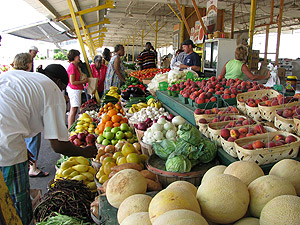There is a clear connection between diet and major diseases such as diabetes, cardiovascular disease, some cancers, osteoporosis, and dental cavities. So, I keep asking—why doesn’t the science of public health undergird food policy in the U.S.? And the corollaries: why doesn’t it guide public policies such as industry subsidies, government purchasing and investment, community planning, public information (e.g., dietary guidelines), and requirements for truth and ethics in advertising? Public policies such as these shape the “food environment” we live in. And because they are public policies, in our democracy we should have a voice in shaping them.

Photo: Natalie Maynor/Flickr
Of course the science of public health encompasses a wide range of fields and a huge amount of information. There is nutritional science, epidemiology, , economics, sociology, medicine and health care, political science, agronomy and many other fields of study that all relate to public health and food policy. As a recent UCS report eloquently shows, the diet-disease connection has ramifications beyond just individual health and the choices we each make every day. What we eat and our current public policies that support unhealthy diets result in a public health crisis which is a major drag on economies around the world.
We will be exploring those connections at a Lewis M. Branscomb Science and Democracy Forum on May 6-7 in partnership with University of Minnesota School of Public Health. We are bringing together experts from many of these fields, along with community organizers, citizens and policy makers. The goal is to recognize barriers to creating a better food environment in cities and towns all across America, and identify the steps needed to overcome those barriers. Implementing better or new policies can of course happen at all levels of government (federal, state, local), as well as by civil society organizations, the private sector, and by citizens directly. We will be looking for solutions that our expert participants and concerned citizens can take into their own work—whether through expressing their views on federal policy or organizing a food council in their town, church or community center.
We have lots of great examples to draw upon. Here are just a few of the organizations joining us for this discussion.
- Minnesota Food Charter: Its goal is to ensure that healthy, affordable, and safe food is a choice for every Minnesotan. Currently, the Minnesota Food Charter Steering Committee is refining the charter for its public launch in October 2014. By informing decision-making processes across the state, and promoting stronger networks throughout communities, Minnesota Food Charter hopes to take on health-related economic impacts and be a driving force for change in Minnesota communities.
- Los Angeles Food Policy Council: This food policy council, one of over 100 councils in the country, exists to bring together diverse stakeholders to study the local food system and offer recommendations for policy change. Two successful initiatives by this Food Policy Council are the Community Market Conversion Program and Healthy Neighborhood Markets Network. These programs provide technical and financial resources to local convenience stores and turn them into healthy food community markets.
- The Food Trust: Started in Philadelphia 20 years ago, The Food Trust has branched out to become a national nonprofit working to ensure that everyone has access to affordable, nutritious food and information to make healthy decisions. They take a comprehensive approach to improving food access by working in schools, corner stores, community centers, supermarkets, farmers’ markets, and through policy change and research. One example of their work in the policy realm is their partnership with the Philadelphia Department of Public Health on its Get Healthy Philly initiative to make the “healthy choice the easy choice” by increasing the access and affordability of healthy foods.
And there are many more impactful initiatives already working to connect what we know from the science of public health to policy actions that can make a difference.
The Center for Science and Democracy at UCS invites your input on organizations and individuals who are leading the way on healthy food policy. If you can, please join us for the public event on May 6th either in person in Minneapolis or via our live webcast. Every single citizen is affected by our food environment and has the power to make it better.
